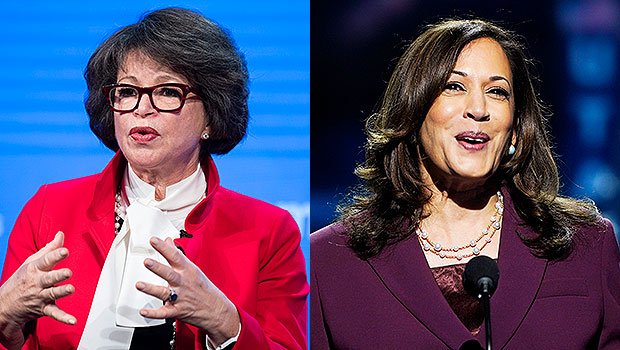Valerie Jarrett: Why She’s Determined To Call Out ‘Racist’ & ‘Sexist’ Media Coverage Of Kamala Harris

Valerie Jarrett refuses to stay quiet if the Democratic VP nominee is treated unfairly in the media based on her race and gender. Here’s why she has Kamala Harris’s ‘back.’
Days before Joe Biden announced that he had chosen Senator Kamala Harris to be his running mate, Valerie Jarrett was among a group of women who put the media on notice.
President Barack Obama’s former Senior Advisor co-signed a letter to major editors, reporters and anchors entitled, We Have Her Back.
The Aug. 6 message was clear: No matter which woman the Democratic presidential candidate chose to be his running mate, if the media subjected her to racist and sexist coverage, they would not remain silent.
Or, to quote the letter, “We intend to collectively and individually monitor coverage and we will call out those we believe take our country backwards with sexist and/or racist coverage.” Or, as the women put it, “we will be watching you.”
Asked why she felt it necessary to release that statement, Jarrett was very candid during an interview with HollywoodLife. “Women who are seeking high office have always been treated by a double standard in the press,” she said. “So we wanted to make sure that the press was on notice that, when that happens, we’re going to call them out on it. And encourage them to think about the language that they’re using and to focus on creating an even playing field and treating men and women the same.”
“We’re not asking for special treatment,” Jarrett said. “We’re just asking for equality, which we deserve and have earned.”
The letter was released months after Biden’s March 2020 commitment to pick a female running mate and days before he revealed that Senator Harris – the child of Jamaican and Indian immigrants – was his choice. The California-native had long been reported to be among the 77-year-old’s finalists, which including a number of women of color. Other candidates rumored to have been on Biden’s list included Obama’s former National Security Advisor, Susan Rice, and Atlanta mayor, Keisha Lance Bottoms. Both women are African-American.
While it wasn’t certain that Harris would be picked, that Biden would select a woman of color was not out of the realm of possibility. Jarrett and her colleagues – which included representatives of Planned Parenthood and the Time’s Up movement – were prepared.
“We did it before she was named because we were already seeing examples of pejorative standards, whether they were sexist or racist tropes, directed at Senator Harris and other potential nominees whose names had surfaced, and we wanted to call it out,” Jarrett said. “And that’s not something that has been done as aggressively as we intend to do it, before. And so there will be no excuses when we do see that because we’ve put everybody on notice that this is unacceptable. In 2020 we should not be using racist and sexist tropes, period.”
Ever since Senator Harris was named, she has been otherized, for lack of a better term. Within days, Newsweek published a birther style op-ed questioning whether, as the daughter of immigrants, she meets the legal standard to hold the office of vice president. On the night her selection was announced, Fox News anchor Tucker Carlson repeatedly mispronounced her first name.
Jarrett is under no illusion about Harris’s ability to defend herself. (Anyone who has seen footage of her grilling former U.S. Attorney General Jeff Sessions during a 2017 Senate Intelligence hearing, for example, knows that she’s more than capable of doing that.) Jarrett’s point is that, she shouldn’t have to.
“I am very confident that Senator Harris can compete very effectively on an even playing field,” she said of the Howard University graduate. “She can compete on an uneven playing field because that’s what she’s had to do her entire life. But she shouldn’t have to do that.”
“And, whether it’s the language that’s used to describe women candidates, or the emphasis on their appearance or their tone or using words like ‘ambitious.’ Well, who isn’t ambitious who wants to be Vice President of the United States?” she added. “What Vice President in our nation’s history didn’t want to be President of the United States? So, why suddenly is that term being used pejoratively towards the first woman of color who’s on the ticket as the Vice President?”
Bearing that in mind, the letter seems to be as much for Harris as it is for the media. “We want her to know that she’s not alone and that there is an ever growing circle of women around the country with powerful voices who intend to speak up and have done so,” Jarrett said. “And will continue to do so.”
As for the media – and the coverage that Senator Harris has received thus far – Jarrett said the letter has largely been a success. “That’s not to say that everybody’s behaving as they should,” she said. “But we’ve certainly received a lot of positive feedback from those in the media saying, ‘Tell us how to do this right.’ That’s an encouraging sign.”